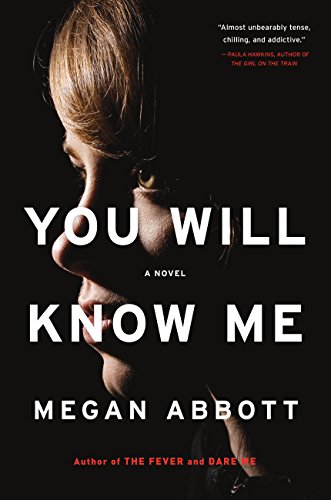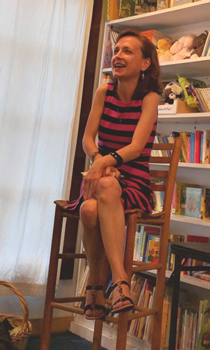Between the Lines: Megan Abbott
Finding Darkness in Bright, Shiny Places
A video went viral after the London Olympics, taken of the parents of American gymnast Aly Raisman as they watched her compete on the uneven bars. The couple flinched, drew together and leaned back as one, fixated on their daughter. Although sitting in the spectators’ area, the gymnast’s parents seemed to move as she moved, utterly unaware of how they might appear.
Reaction to the video on the Internet was amused, scornful, and appalled. How could it be healthy for parents to be that identified with their daughter?
Novelist Megan Abbott had an altogether different response. Could she explore the world of female competitive gymnastics—specifically, the family of the gymnast—in her next novel of suspense? The answer to that question is YOU WILL KNOW ME. In the novel, the tensions of a close suburban family, devoted to the high-stakes training of talented teenage Devon Knox, explode after a sudden death in their gymnast community. Devon’s mother, Katie, finds her life unraveling as she realizes not only her daughter (on an Olympics track) but also her obsessed-with-greatness husband are becoming unknowable to her.
“I’ve always been interested in the families of prodigies and how the power circulates,” Abbott says. “With parents of teenagers, there’s the moment when you realize there are things about them you will never know.” If that child is the focus of the family because of an exceptional talent, then it becomes even more difficult to maintain control.
Abbott’s work has won critical acclaim for her stylish prose, descriptive power and complex characterizations: “Crushed cocktail parasols gathered on the sills and crumpled leis collected in the corners like parade remnants catching on her feet, heels too high, too narrow, and she found Devon in the restroom, washing her face, washing all the performance makeup away. Turning to her mother, she looked oddly blank.”
Each novel takes Abbott at least a year to draft. “I work on pacing the most,” she says. “Character has always been the place I begin, my anchor, but suspense comes in the later drafts, in rewriting. With immense help from my agent Dan Conaway and my editor Reagan Arthur. It’s very hard to read your own work for the hundredth time and understand how suspense operates. I count on them!”
Abbott, not an athlete as a child, grew up in a bookish Michigan family. Yet she remembers her entire family revolving around her brother’s baseball games for a time and drew on that dynamic in creating the fourth member of the Knox family, Devon’s younger brother Drew, more interested in science than balance beams. He is the one who sees things perhaps the most clearly in the entire family—and becomes a figure of poignant tragedy.
In her first books, Abbott’s focus was on crime and noir. Two of them reference notorious crimes. The Song Is You is based on the disappearance of Jean Spangler in 1949, and Bury Me Deep on the 1931 case of Winnie Ruth Judd, who is known as “the Trunk Murderess.” She is also the author of a nonfiction book, The Street Was Mine: White Masculinity in Hardboiled Fiction and Film Noir, and the editor of A Hell of a Woman, an anthology of female crime fiction.
The connection between noir and her three most recent novels, Dare Me, The Fever (winner of ITW’s Best Hardcover Novel 2015) and YOU WILL KNOW ME, all focusing on teenage girls, is stronger than one might think. Says Abbott: “Noir I came to as a kid, through the movies, and I responded to its big themes, its glamour, its high drama. To me, noir lets you explore all the big emotions of life—desire, greed, ambition, fear, regret, jealousy, longing. Whether you’re writing about 1940s Hollywood or contemporary suburbia, those feelings are just as intense, just as dangerous and just as universal. I carry them, whatever I’m writing about. Portable noir!”
Moreover, “there’s nothing more noir than family.”
Dare Me is set in the competitive arena of teenage cheerleaders and, like YOU WILL KNOW ME, runs on the wires connecting adolescent sexuality, sudden violence, and power. Bad things happen in suburban bedrooms and backyards.
Abbott resists the categorization of “domestic thriller,” however.
“ ‘Domestic’ makes me think of ‘domestic arts,’ which is what they used to call ‘home economics,’ and reminds me of how I could never thread the sewing machine,” she says. “I know we have a need to categorize and then categorize again, but my impulse is just to think of them, including my own, as crime novels—but ones that focus on psychology, and on intimate relationships, whether familial or romantic or marital or among friends. But I think if the term helps readers find the books they want, than I’m all for it. That’s what really matters.”
She also thinks deeply about the resurgence of interest in “true crime” in popular culture. “Women have always been the greatest consumers. The recent vogue has brought in new audiences and readers, but the reasons, I think, are the same. True crime is a way to explore our own anxieties, and the cultural anxieties of the day: negotiating power at home and in the bedroom, sexual identity, the complexities of motherhood, the darker corners of marriage, the way social media has made the slipperiness of self even slipperier. The most resonant books are the ones that hit closest to home. When I read crime reportage, I feel uncomfortably like I have my eye to the peephole, but in the end we’re only looking at a more extreme version of all our lives in some way.”
Abbott says, “For a writer, having to consider both what I’m seeing—and why I’m looking at all—feels equally important.”
- Up Close: Kris Waldherr - September 30, 2022
- Up Close: Wendy Webb by Nancy Bilyeau - October 31, 2018
- Between the Lines: J. D. Barker - September 30, 2018



